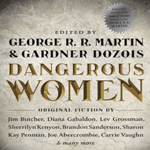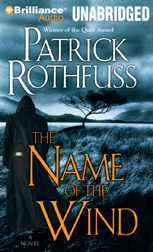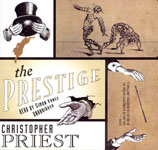
 Dangerous Women: Stories
Dangerous Women: Stories
Edited by George R. R. Martin and Gardner Dozois
Narrated by Scott Brick, Jonathan Frakes, Janis Ian, Stana Katic, Lee Meriwether, Emily Rankin, Harriet Walter, Jake Weber
Publisher: Random House Audio
Publication Date: 3 December 2013[UNABRIDGED] – 32 hours, 49 minutes
Listen to an excerpt: | MP3 |
Themes: / short stories / fantasy / women /
Publisher summary:
All new and original to this volume, the 21 stories in Dangerous Women include work by twelve New York Times bestsellers, and seven stories set in the authors’ bestselling continuities—including a new “Outlander” story by Diana Gabaldon, a tale of Harry Dresden’s world by Jim Butcher, a story from Lev Grossman set in the world of The Magicians, and a 35,000-word novella by George R. R. Martin about the Dance of the Dragons, the vast civil war that tore Westeros apart nearly two centuries before the events of A Game of Thrones.
Also included are original stories of dangerous women–heroines and villains alike–by Brandon Sanderson, Joe Abercrombie, Sherilynn Kenyon, Lawrence Block, Carrie Vaughn, S. M. Stirling, Sharon Kay Penman, and many others.
Writes Gardner Dozois in his Introduction, “Here you’ll find no hapless victims who stand by whimpering in dread while the male hero fights the monster or clashes swords with the villain, and if you want to tie these women to the railroad tracks, you’ll find you have a real fight on your hands. Instead, you will find sword-wielding women warriors, intrepid women fighter pilots and far-ranging spacewomen, deadly female serial killers, formidable female superheroes, sly and seductive femmes fatale, female wizards, hard-living Bad Girls, female bandits and rebels, embattled survivors in Post-Apocalyptic futures, female Private Investigators, stern female hanging judges, haughty queens who rule nations and whose jealousies and ambitions send thousands to grisly deaths, daring dragonriders, and many more.”Stories and Narrators (in order of appearance):
“Some Desperado” by Joe Abercrombie; Read by Stana Katic
“My Heart Is Either Broken” by Megan Abbott; Read by Jake Weber
“Nora’s Song” by Cecelia Holland; Read by Harriet Walter
“The Hands That Are Not There” by Melinda Snodgrass; Read by Jonathan Frakes
“Bombshells” by Jim Butcher; Read by Emily Rankin
“Raisa Stepanova” by Carrie Vaughn; Read by Inna Korobkina
“Wrestling Jesus” by Joe R. Lansdale; Read by Scott Brick
“Neighbors” by Megan Lindholm; Read by Lee Meriwether
“I Know How to Pick ’Em” by Lawrence Block; Read by Jake Weber
“Shadows for Silence in the Forests of Hell” by Brandon Sanderson; Read by Claudia Black
“A Queen in Exile” by Sharon Kay Penman; Read by Harriet Walter
“The Girl in the Mirror” by Lev Grossman; Read by Sophie Turner
“Second Arabesque, Very Slowly” by Nancy Kress; Read by Janis Ian
“City Lazarus” by Diana Rowland; Read by Scott Brick
“Virgins” by Diana Gabaldon; Read by Allan Scott-Douglas
“Pronouncing Doom” by S.M. Stirling; Read by Stana Katic
“Name the Beast” by Sam Sykes; Read by Claudia Black
“Caregivers” by Pat Cadigan; Read by Janis Ian
“Lies My Mother Told Me” by Caroline Spector; Read by Maggi-Meg Reed
“Hell Hath No Fury” by Sherilynn Kenyon; Read by Jenna Lamia
“The Princess and the Queen” by George R. R. Martin; Read by Iain Glen
It took me a really long time to make it through this book, even with skipping stories, and that was a big sign that it wasn’t working for me. I love and read a lot of anthologies, and Dangerous Women was odd in that it only paid lip service to the theme. Most of these stories had nothing to do with women, dangerous or otherwise, instead focusing on men talking about women. Overall, while I was disappointed in this anthology, and would not recommend it, here are my spoiler thoughts on some of the best and worst individual stories (scroll to the end for a link to more!):
“The Hands That Are Not There” by Melinda Snodgrass
Jonathan Frakes from Star Trek: the Next Generation is the narrator!!! Fortune 500? Strip club? OK, I’m missing the dangerous women portion of this story at the beginning, and am a little confused overall. The main character doesn’t seem to have a great opinion of women in general. Suppose that’s not surprising considering this takes place during a bachelor party. “Sassy little buttocks”? I giggled when he shouted “blackout’. Genetic manipulation? What am I listening to?
Holy. Hell.
Aside from the novelty of the narrator, this was just bad. The characterization of women left a bad taste in my mouth. The prose was an unfortunate shade of purple. The plot twist was silly. So. Bad.
“Bombshells” by Jim Butcher – A Harry Dresden story
I’ve never read any of the Dresden books, although I’m vaguely familiar with the story, and this was a sorely needed palette cleanser after the last story. Except for the leg-shaving bit. Wut? That came across as trying a bit too hard. Bit more telling than showing than is to my taste. And hearing the phrase ‘soul gaze’ spoken out loud just pointed out how silly it is. Holy infodump on how magic works, but overall both the narrator and writing was A+.
“Raisa Stepanova” by Carrie Vaughn
Eeeeeee! Night witches! I love female pilots!
The writing is concise and easy to follow, but full of effective details that really conveyed the feeling of a fire fight. The plot was just heartbreaking. And a lovely relationship between siblings is the focus, rather than a romantic one. Such a nice change! This was an excellent portrayal of female non-competitive friendship. So good. One of the highlights of the anthology.
Narrator had a distinctive, lovely voice.
“I Know How to Pick ’Em” by Lawrence Block
Noir up the wazoo! This was a man’s man kind of a story, I guess. Wow. I had to skip this after he started fantasizing about beating the woman he was with. He had so much hate for women. I felt a little sick just listening.
Narrator has great, gritty voice.
“Shadows For Silence in the Forests of Hell” by Brandon Sanderson
This was a great story. Silence was amazing, and the world had just enough detail for you to believe and fill in the rest of the blanks. Her background as a bounty hunter was inventive, and I loved seeing the people people who crossed her get their eventual comeuppance.
Narrator had just enough weariness in her voice to be pleasing and appropriate to the story.
“The Girl in the Mirror” by Lev Grossman – A Magicians story
Fabulous characterization of mischievous girls at a magical school. Their talk is real, and the details are well delineated. Think Harry Potter but darker and meaner. Adorable short story. Just lovely.
As an added bonus, Sophie Turner, who plays Sansa Stark on Games of Thrones, was the narrator. She hit the perfect tone, and I would definitely listen to her narration again.
“Second Arabesque, Very Slowly” by Nancy Kress
This was a very quiet, intense, and bleak story. The women are essentially kept for breeding in a post-apocalyptic setting, but during a young girl’s ‘budding’ ceremony, one woman voices her desire to be more. The narrator is the nurse, in charge of the health of the other women. There’s an undertone of packs and the urban forest in this story, like I was waiting for them to turn into werewolves. Women have dressed codes to avoid tempting men, but are somewhat in charge of deciding who they have sex with. The group finds a TV and get it to work. They watch a ballet. Now one of the beta males wants to learn how to dance to entertain the pack. They find a moment of beauty, but lose it just as quickly.
The narrator has an understated style that worked really well for this.
“Pronouncing Doom” by S.M. Stirling – An Emberverse story
This was the most unpleasant part of this whole experience.
At first I was interested, as there was a main character traveling with a baby and some practical discussion of how life with children after the apocalypse works. There were disabled characters, and the women seemed to have some autonomy in the society.
However, the story then turned into a rape trial. The victim recounts escalating abuse from one man, and how the other women blamed her for his actions. Then she describes his violent sexual assault of her, and I turned it off. I had no motivation to finish this story.
The narrator was very pleasant, and her deadpan accounting of the assault was chilling.
“Caretakers” by Pat Cadigan
It starts out with an innocent question about female serial killers. These two sisters live together and while one is obsessed with Red Dawn (Go Wolverines!) the other loves to watch shows about serial killers. There was a lot of realistic characterization driving the story, and rising tension as you begin to wonder exactly how much the sister likes serial killers.
Narrator did a fantastic job, fading back to let the story stand on its strengths.
“Lies My Mother Told Me” by Caroline Spector – A Wild Cards story
I felt a little behind by the abrupt entrance of the first scene, but loved the discussion of prettiness in relation to society. Parades and zombies and consumerism. Mothers and daughters and self-esteem. Fat and bubbles as defense. The villain was such a dick, and such a stereotype of gamer dudes. Overall amazing!
Fantastic narrator.
“The Princess and the Queen” by George R.R. Martin – A Song of Ice and Fire story
Finally. this is the whole reason I was interested in the first place. I’ve read a couple of the ASOIAF books, so I was interested in what Martin would do with two super-powerful women. Not much, it turns out.
Sooooo – everyone in Westeros has always been terrible and power-hungry? OK then. First Night rites? Really? Ahhhh I am so bored. Never has anything with dragons in it bored me as much as this has. It’s about queens, yes, but it’s still the men who do almost everything.
Good narrator, though.
Sarah reviewed each and every story, which you can see on her GoodReads review.
Posted by Sarah R.


